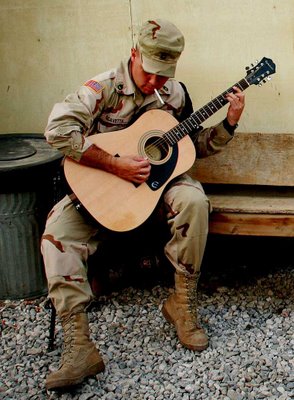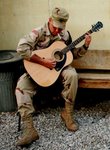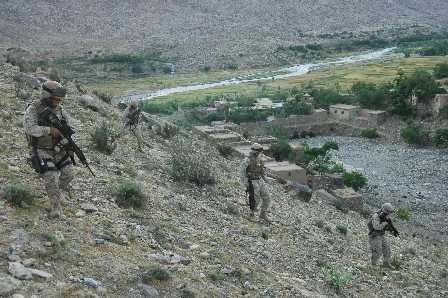
Education can be one of the most positive influences for veterans returning from the wars in Afghanistan and Iraq .
Coming home is not easy.
When you come home from such an odyssey in far flung corners of the world, when you’ve endured hardships and loneliness, when you’ve witnessed wonders of foreign cultures and the excitement of the expedition, when you’ve felt stress and fatigue from patrols that seemed like they would never end, when you’ve faced combat and sorrow – the transition to the normalcy you once knew is civilian life is extremely challenging.
Back home, people are focused on downloading the latest ring tone for their new camera phone, the videos they can play on their Ipod and the mindless sitcoms on the 200 channels of cable television. Quite often, our fellow Americans only know about the war from the political campaigns, radio talk shows and the occasional blurb from the Internet. Yet, they form opinions about the war, pro and con, based on information told to them from a man in a suit behind a podium in Washington .
They never smelled the gunpowder, heard the screams or saw the horror.
Quite often, even your own family is more than ready to put the war behind them. They endured their own suffering and loneliness when you were away – and they don’t want to talk about it.
How often have I heard the phrase – “you need to go talk to someone.”
Talk to someone. Talk to someone.
They mean a shrink at the veteran’s hospital? By the way, the VA hospital automatically offers returning troops medication and only makes appointments during business hours.
So if you are trying to adjust to civilian life, get a job and take care of your family – don’t expect to a chance to “talk to someone” at the VA.
What would we talk about – if we could. What is it really like coming home?
It could be a simple as the sound of cricket outside your bedroom window that reminds you of the cricket you laid down beside on a hillside in Afghanistan .
Or scanning open windows and rooftops while walking though the streets of New Haven . Running from the roar of a passing dump truck, laughing as you convince yourself that it was not actually a rocket attack.
Live through a roadside bomb explosion, then come home watch an IED explosion on TV – sitting on the couch next to your three-year-old. Then wonder how the rest of your days is going to be.
Maybe it’s asking yourself why you feel more comfortable outside, alone with the warmth of a cigarette than inside with family and friends at the party.
Coming home is not easy.
But the fact is – and it’s tough to realize at times - Our war is over and we are home.
Some of us have returned to school, with the hopes of bettering our selves though education. Many schools, to include the university where I received my undergraduate degree, were not staffed to really assist veterans any more than shuffling their paperwork off to the VA. Others are now realizing that veterans will be a significant presence on their campuses and reacting by bolstering their programs.
Just recently, Jack Mordente the director of veteran's affairs at Southern Connecticut State University tracked down answers on new benefits for Reserve and Guard troops returning from the war.
When they were told they would lose their GI Bill education benefits if they left the Guard or Reserve, Jack pressed government leaders for accurate information – in fact troops are eligible after they stop drilling with the Guard or Reserve and are due benefits similar to the active duty troops they serve with during their wartime service.
He's continuing this effort by alerting veterans on campus, speaking with legislators about the problem and working with the press to get the word out.
When you come home, you feel like you have lost direction. You’re not the same person anymore and you never will be.
From sleeping in your dirty boots and uniform for days on end, to dry cleaned shirts and suits. From long patrols in enemy areas to long commutes in traffic. To the rush of military operations in a far away country to eight-hour days in an office without windows.
The memories of the war are fresh and reoccurring, closer to us now than the re-runs of last year's TV episodes that fill the glowing box in our living rooms.
We dreamt of returning to America , during the long and lonely nights. We joked among fellow troops about how long it would take a shrink to help us forget the terror. We missed our families desperately.
Now, we have come home – and coming home is not easy
Thank God for evening classes at the local university. I was surprised and very glad to find that in my graduate political science course there were at least three other veterans attending. We’re here for similar reasons – to better ourselves though education and to better understand the politics that brought our country into the conflicts in the Middle East and Central Asia . In class, we can open up in intelligent discussion, where our opinions matter and offer a unique perspective.
I was also impress to Arabic offered at SCSU– one of the few colleges around that has such a program. I enrolled immediately – even though it does not count toward my graduate degree.
I remember standing at a checkpoint late one night in Baghdad in early 2003 – we were saying to each other – Why were we never taught anything about this place, the people, their language, their faith, their culture? I promised myself to try and change that.
We must educate ourselves about the Middle East and Central Asia . Veterans who choose the path to education and improve ourselves with higher learning will no doubt be the leaders in our communities, in business and government.
I'm often asked to compare our current conflicts in Iraq and Afghanistan to the war in Vietnam . Obviously there are many differences. But when you look for similarities – I choose to focus on our veterans' perspective.
In previous American wars, society embraced the national cause behind the fight – armies fought and conquered. So many more people served in uniform that nearly everyone in America was affected in some dimension. And when the enemy was defeated, troops came home as recognized veterans. They took Berlin , crushed the Nazis, had their ticker-tape parades and got a factory job and told their stories.
We don’t have that. We filter back into civilian life - mostly unnoticed.
Veterans returning now are more like are uncles from Vietnam . We trickle back into society and get to watch the war on TV for the next few years as it grinds on. All around us, we hear people who were not over there complaining about politicians and the growing unpopularity of the war.
I often have people thank me, when they find out I served in Afghanistan and was also in Iraq . And I’m glad to see them take notice. Now I ask them to do more. Don’t just slap a support the troops sticker on your car and thank a vet if you happen to met them.
Take the time, to learn more about the conflict – read more books and from the Internet. Then talk to the retuning veterans, engage them, offer your friendship – you will benefit and so will they.
Coming home is not easy.
But having a university to attend, to expand our knowledge – to bond among fellow veterans on campus and other students interested in our experience


No comments:
Post a Comment